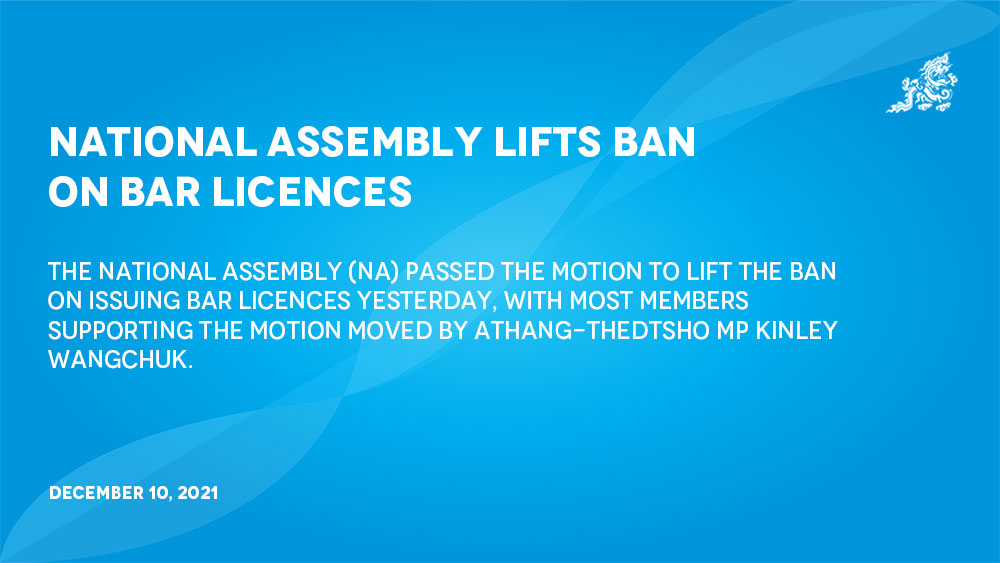Thukten Zangpo
The National Assembly (NA) passed the motion to lift the ban on issuing bar licences yesterday, with most members supporting the motion moved by Athang-Thedtsho MP Kinley Wangchuk.
Thirty-seven members voted ‘yes’, three ‘no’, and one abstained out of 41 members present in the House.
MP Kinley Wangchuk moved the motion to lift the ban on bar licences, seconded by Chhoekhar-Tang MP, and to increase and adopt a single bar and retail licence fee.
The second point to the motion was that the Ministry of Health and relevant stakeholders maximise their efforts in creating awareness of the ills of alcohol consumption.
The restriction on the issue of bar licences since 2010 has not reduced consumption of alcohol, but has increased illegal sales of alcohol, fronting, and the unethical licence trade and operation of numerous illegal bars, said MP Kinley Wangchuk.
“Since then, the country has seen an increasing number of bars and wine shops, and also an increasing level of alcohol consumption,” he added. After the ban, about 1,000 bar licences were issued to hotels that have more than eight rooms.
The MPs also pointed out that the ban had only benefited the big businesses and wholesalers who were given the licences, leading to an increase in the gap between the haves and have nots.
MP Kinley Wangchuk also said that the practice of selling and renting bar licences has become rampant, where people were willing to buy licences illegally at Nu 500,000 to Nu 600,000 when the actual licence fees range from Nu 5,000 to Nu 15,000. “This has affected standalone bars in the country,” he added.
According to Section 284 (g) of the Penal Code, renting of licences between Bhutanese is fronting and illegal.
“Bhutan’s cultural acceptance of alcohol, weak coordination among rule implementing agencies, availability, and affordability are some of the major contributing factors for alcohol consumption,” Kinley Wangchuk said.
He added that the per capita (adult) alcohol intake among Bhutanese is 8.47 litres. On the other hand, the global consumption is at 6.2 litres per person. Furthermore, there is one alcohol outlet for every 134 Bhutanese.
Not supporting the motion, Health Minister Dechen Wangmo said that lifting the ban on bar licences would impact the health of the people and health expenditure incurred due to treatment of alcohol-related diseases.
Alcohol-related diseases are the number one killer in the country, Lyonpo said, adding that 99 percent of the people with alcohol-related diseases are below 50 years of age, and the ministry spent about Nu 26 million annually to treat alcoholic liver diseases.
She also said that the issue lies in the failure to strictly implement the ban and suggested a detailed assessment before lifting the ban.
Prime Minister Dr Lotay Tshering supported the health minister’s reasoning and not the motion. He said that he did not receive the assessment study on whether lifting the ban on bar licences will have increased the number of drinkers or not, which the Ministry of Economic Affairs and Ministry of Health were supposed to submit.
Meanwhile, Foreign Minister Dr Tandi Dorji said that lifting the ban would resolve the fronting of bar licences. The rules that say not to have bars near the schools and hospitals will have to be looked into with proper monitoring and regulation, he said.
“If lifting the ban increases the alcohol-related diseases, we have an opportunity to discuss it again in Parliament after a year,” Lyonpo said.
Minister of Economic Affairs Loknath Sharma said that the ban is counterproductive to the country, and the ministry will not support alcohol drinking.
There are about 4,500 bar licences, 600 retail liquor shop licences, and 195 wholesaler licences issued in the country.


